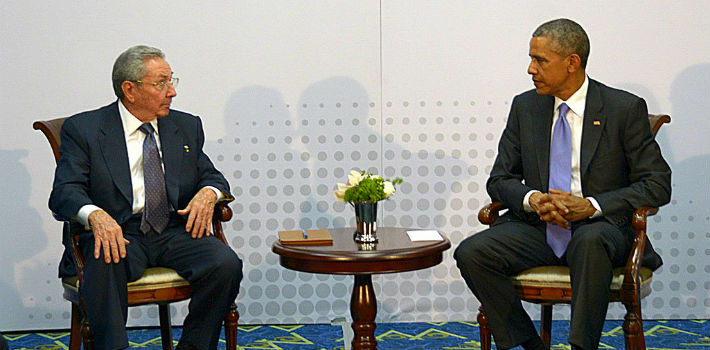
EspañolAfter US President Barack Obama made his announcement regarding the new US policy on Cuba late last year, Havana’s eventual removal from the government’s list of states that sponsor terrorism became a fait accompli. What was a six-month review now appears to have been a foregone conclusion, ignoring the long record and mounting evidence that Cuba continues to support terrorists from not just in the region, but also from as far afield as the Middle East.
A little context. Cuba was first placed on the list on March 1, 1982, for offering “material and political support” to terrorists from Latin America to Africa. Throughout the Cold War, it was well known that Havana was a safe haven for terrorists from around the world, most notably the Revolutionary Armed Forces of Colombia (FARC) and Basque Fatherland and Liberty (ETA), an armed movement seeking independence from Spain.
Proponents of the president’s decision will point out that ETA is practically non-existent, and that the FARC is in a transition period, currently negotiating its status with the Colombian government in talks hosted by Havana itself. Moving past the Cold War means retiring policies that are no longer relevant, or so the White House would argue.
But the facts don’t match the fanfare. According to research at the Center for a Secure Free Society (SFS), the Cuban government recently helped the Bolivarian Republic of Venezuela create a criminal-terrorist pipeline serving to funnel funds and drugs to the Middle East from Latin America, and bringing back foreign fighters and Islamic terrorists in return. Cuba’s role in this scheme should be properly understood.
In 2003, when Venezuelan caudillo Hugo Chávez needed to overhaul immigration procedures to serve the needs of his Bolivarian revolution, he turned to no less a figure than Cuban Vice President General Ramiro Valdéz, a revolutionary of the old guard who once served as Cuba’s Interior Minister and head of the feared G-2 Intelligence Directorate.
Cuba has ensured that terrorists have a robust presence in the Western Hemisphere, even facilitating their entry into North America.
In Venezuela, one of General Valdéz’s most notable achievements was using Cuba’s state-run University of Information Science to set up a new immigration system for the Bolivarian Republic.
Vice Chancellor Lavandero Garcia was tasked by Gen. Valdéz with leading the project, and he began overhauling the IT systems of the Venezuelan passport and naturalization agency, formerly known as ONIDEX.
Several years later, this new information and immigration system was fully operational under the name SAIME. Since 2009, SAIME has been under the overarching control of Cuban agents but managed by Chavistas, some with close ties to Islamic terrorist networks.
From 2009 through 2012, Venezuela’s new Cuban-controlled immigration system delivered passports, visas and national IDs to at least 173 Islamic militants from the Middle East, many suspected of affiliation with the Lebanese terrorist organization Hezbollah.
Immigration controls are an important function of a national government. Information systems, biometrics, review processes, and personnel are meant to serve as a country’s last line of defense from potential terrorists entering their territory. In the case of Cuba and Venezuela, they do the exact opposite.
Instead of stopping the flow of terrorists, these governments facilitate the travel of Islamic extremists into the Western Hemisphere by providing them a free pass on immigration, along with allied anti-US countries in the region. Aside from Venezuela, other ALBA nations such as Bolivia, Ecuador, and Nicaragua are believed to have received similar immigration and IT support from Cuba.
Over the decades, Cuba’s foreign policy has been to work with Washington’s enemies around the world, a policy which earned them a place on state sponsors of terrorism list in the first place. More than 30 years later, there are no signs that Havana’s foreign policy has changed, as it remains closely aligned with Tehran and Damascus, who remain designated as backers of transnational terrorist movements.
While the FARC and ETA may be a problem of the past, Islamic terrorism continues to threaten US national security. Cuba has played a significant role in ensuring these terrorists have a robust presence in the Western Hemisphere, even facilitating their entry into North America.
This warrants consideration because, as we learned from the grim example of North Korea, a premature decision to remove a state from the list of sponsors of terrorism can have dire consequences — for international security, and the well-being of that country’s people.
Edited by Laurie Blair.
 Versión Español
Versión Español












